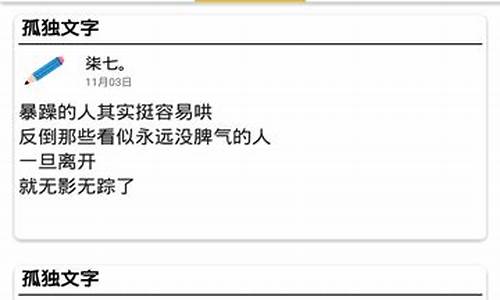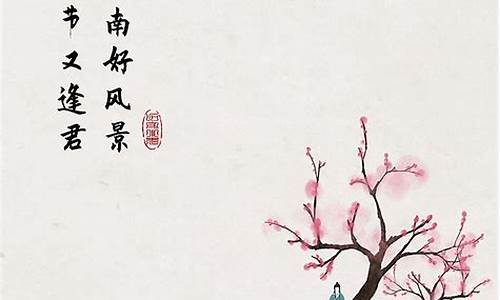您现在的位置是: 首页 > 文案大全 文案大全
八年级上册英语第七单元重点句子_人教版八年级上册英语第七单元重点句子
tamoadmin 2024-08-28 人已围观
简介1.八年级上册英语7单元2d的翻译2.八年级上册unit7课件3.八年级上册英语重点句20个4.快开学啦、求英语八年级上册1-5单元的句子、至少20个、 拜托啦、快一点、十万火急、5.八年级上册英语知识点造句 随着社会不断的发展,英语的使用越来越普遍,下面是我整理的八年级上册英语第7单元课件,希望对你有帮助。 八年级上册英语第7单元课件一 Section A 一、教师寄语: Among a
1.八年级上册英语7单元2d的翻译
2.八年级上册unit7课件
3.八年级上册英语重点句20个
4.快开学啦、求英语八年级上册1-5单元的句子、至少20个、 拜托啦、快一点、十万火急、
5.八年级上册英语知识点造句

随着社会不断的发展,英语的使用越来越普遍,下面是我整理的八年级上册英语第7单元课件,希望对你有帮助。
八年级上册英语第7单元课件一Section A
一、教师寄语: Among any three people walking, I will find something to learn for sure. Their good qualities are to be followed, and their shortcomings are to be oided.
三人行,必有我师焉。择其善者而从之,其不善者而改之。
二、学习目标
知识目标:
1. woeds: vocabulary :blender , yogurt , turn on , cut up , peel , pour , put into , ingredient ,cinnamon , teaspoon , amount ,watermelon .
2. Patterns: How do you make a banana milk shake?
How many bananas do we need ?
How much milk do we need ?
能力目标:学会使用how many和how much分别对可数名词和不可数名词的量提问.
情感目标:培养学生热爱劳动的习惯.
三、教学重点:可数名词和不可数名词的运用以及对他们量的提问。
教学难点.:如何描述过程。
四、学习过程
(一)预习导学及自测
从方框中选择适当的单词完成下列句子
salt, turkey, check, roll, sauce
1. Finally ____ the pancake.
2. ____ looks like sugar.
3. How many teaspoons of ____ do you need?
4. Did you ____your answers?
5. Put some ____ slices on the sandwich.
(二)自主学习
SB Page 41 , 1a .
Look at the picture .What can you see ?
Point out the blank likes in the picture .Ss twrite the names of the actions .Choose the correct words .
Ss fill in the blanks on their own .
Check the answers .
SB Page 41, 1b .
Point out the actions in the picture and the list of actions in activity 1b .
Play the recording and check the answers .
SB Page 42 , 2a .
Point out the two columns in the chart and read the headings .Say , Maria and Katie are talking about making fruit salad .Listen carefully .What do they need ?Write the names of the ingredients .
Play the recording and check the answers .
SB Page 42 , 2b .
Listen again .This time listen to the amout of each ingredient the girls talk about .Write the name of each ingredient next to the correct amount .
A student reads the amounts in the first column .
Play the recording .Ss work .Check the answers .
SB Page 43 , 3a .Look at the picture and answer what the boy and girl are doing .
Read the four words at the beginning of the activity .
Answer the number the words to show the order .
Read the conversation .And complete it .
(三)合作探究
SB Page 41 , 1c .
Point out the instructions in activity 1b .And talk with a partner .
SB Page 42 ,2c .
Read the instruction for the activity .
Point to the sample conversation .Two students read the questions and answers to the class .
Ss work in pairs .
Some pairs to present their conversations .
(四)拓展创新
Grammar focus .
Review the grammar box .Ss to say the questions and answers .
Write the words countable and uncountable on the Bb .
One or two students explain what these words mean
Pay attention to the verb , there are imperative sentences .Students say sentences like these .
SB Page 43 , 3b .Point out the picture .
Ss tell what is hening in each picture. Review the words :popcorn , popcorn popper ,salt , bowl .
A student read the directions in the box .
Ss work with partner ,then one or two students tell the class how to make popcorn .
I want three bottles of milk.我想要三瓶牛奶。
Please give him a piece of paper.请给他一张纸。
也可以用some, any, a lot, lots of, much, a little等来修饰表示泛指的数量。
He has a lot of time to study.他有大量学习的时间。
对数量进行提问时,how many后接可数名词复数;how much后接不可数名词。
—How many oranges did he buy?他买了多少个橘子?
—He bought five oranges. ?他买了五个。
—How much water do you drink every day?你每天喝多少水?
—I drink eight glasses of water every day.我每天喝八杯水。
(六)达标检测
Ⅰ.用所给短语的正确形式填空,每个只能用一次
cut up , turn on, mix up, add…to…, put… into…
1. Please ____ the ingredients ____ the soup.
2. Don’t ____ the blender.
3. Please ____ the three les.
4. He ____ meat ____ the bread.
5. Finally, he ____ all the ingredients.
Ⅱ.根据汉语提示完成英语句子
1. Let’s make ____ ____(水果沙拉).
2. That’s a ____ ____(好主意).
3. Your mother needs three ____ ____ _____(茶匙蜂蜜).
4. First, we should ____ _____(搅匀)water and flour.
Ⅲ.对下列各句的画线部分提问,每空一词
1. We need two cups of orange juice.
____ ____ _____ ____ orange juice do you need?
2. There are twenty boys in our class.
____ ____ ____ are there in your class?
3. He wants two slices of bread.
____ ____ ____ does he want?
五、典型例题解析
1.Don’t ____ too much TV, It’s bad for your eyes.
A. watch B. watched C. watching D. to watch
<点拨>本句是否定祈使句,don’t后接动词原形,故排除B, C, D三项。<答案> A
2.—Please come ____ the room. It’s raining hard outside.—Thank you.
A. over B. out C. into ?D. on
<点拨> come over意为“顺便来访”,接介词to之后,再加地点宾语,故排除;come out加地点名词时要先加介词of,排除;come on意为“加油;过来”,不符合句意;句意为“外面雨下得很大,请进屋吧。谢谢。”故选 C项。<答案> C
3. Do you know how ____ the blender?
A. open B. to open C. turn on D. to turn on
<点拨>打开果汁机用turn on,排除A, B两项;疑问词后常接不定式,故排除C项。
六、中考链接
1.(2009湖州)Put the ingredients in a bowl and ____, please.
A. mix up it B. mix it up C. mix up them D. mix them up
2.(2009益州)Please ____ some salt to my soup.
A. turn B. put C. make D. add
七、课后反思
我的收获:___________________________________________________________________
我的不足:__________________________________________________________________
八年级上册英语第7单元课件二学习目标
1.熟练掌握本单元词汇:
2.熟练掌握本单元句型:
5) In 20 years,I think I’ll be a newspaper reporter.
(2) On the weekend, I’ll look less smart but I will be more comfortable.
(3) What will your… be like ?
学习重点
难点 本单元的单词、短语、语法
学法指导 及时练习与巩固
教学过程
一、 导入(启发探究 ?3分钟)
对话复习:
Nick: What are you reading, Jill?
Jill: It’s book about future.
Nick: Sounds cool. So what will the future be like?
Jill: Well, cities will be more crowded and polluted. There will be fewer trees and the environment will be in great danger.
Nick: That sounds bad! Will we he to move to other planets.
Jill: Maybe. But I want to live on the earth.
Nick: Me, too. Then what can we do?
Jill: We can use less water and plants more trees. Everyone should play a part in sing the earth.
二、自学(自主探究 ?6分钟)
用法:
will + 动词原形 ? 将要做
fewer/more + 可数名词复数 ?更少/更多…
less/more + 不可数名词 ? 更少/更多
try to do sth. ?尽力做某事
he to do sth ? 不得不做某事
agree with sb. 同意某人的意见
such + 名词(词组) ?如此
play a part in doing sth ?参与做某事
make sb do sth 让某人做某事
help sb with sth ?帮助某人做某事
There will be + 主语 + 其他 ? 将会有….
There is/are + sb. + doing sth ?有…正在做…
It is ?+ 形容词 + for sb + to do sth ?做某事对某人来说…的
三、交流(合作探究 ?10分钟)
语法:
What will the future be like Cities will be more polluted. And there will be fewer trees.
Will people use money in 100 years ?No, they won’t. Everything will be free.
Will there be world peace ? Yes, I hope so.
Kids will stuffy at home on computers.
They won’t go to school.
Countable ? nouns Uncountable nouns
There will be more people. ?There will be more pollution.
There will be fewer trees. ?There will be less free time.
四、总结(引深探究 ?15分钟)
词语辨析:
1. every 与 each 的区别:
every 用来表整体,each 用来表个别。each 最低需是两,every 最低需是三。every adj.
every 作主用单数,each 可单也可复,作主、作定用单数,其他情况用复数。 each ?adj./ pron.
Every teacher knows her.
There are lots of trees on each side of the road.
Each of the road has a dictionary.
2. on the earth ?在地球上,作地点状语,位于句首或句末。 on earth 究竟,到底。用于疑问句或副词后,加强语气。
All the living things on the earth depend on the sun. / ?What on earth do you mean?
3. human, 指包括男人女人孩子的“人,人类”,有别于动物,自然景物,机器等的特殊群体,也可指具体的人。
person, 无性别之分,常用于数目不太大,而且数目比较精确的场合。
people, 泛指“人们”,表示复数概念。
man,前不带冠词而且单独使用时,指“男人”,a man 可指“一个人/ 一个男人”,复数形式为men.
He was the only human on the island.
There are only three persons in the room.
There are many people there.
Man is stronger than woman.
4. seem 连系动词,好像,似乎,看来。有下面几种用法:
seem + 名词 ?看起来。He seems ?a nice man.
seem like 好像,似乎。 ? It seemed like a good idea at the time.
seem to do sth. 似乎/看起来/好像做某事。 ?I seem to he left my book at home.
It seems/seemed that ? 看起来好像…, 似乎…. He was very hy.
seem to be + 形容词/名词 = seem + 形容词/名词。 ?She seems to be hy.= She seems hy.
5. probably ad. maybe 相当于 perhaps. 也许,大概,可能。作状语.
probably 用于句中,可能性最大。 He will probably come tomorrow.
maybe/perhaps 用于句首。 ?Maybe/Perhaps you are right.
1. during / for / in ?介词,在……期间。说到某事是在某一段时间之间发生的用during; 说到某事持续多久则用for; 说到某事具体发生的时间用in.
We visited many places of interest during the summer holiday.
I’ve been here for two weeks.
They usually lee school in July.
五、练评(包含“考点链接” ? 应用探究 ?6分钟)
读“What will your life be like in the future?”短文,用所给单词填空。
In 20 years, I think I’ll be a newspaper reporter. I’ll ________in Shanghai, because there will be _______jobs in that city. As a reporter, I think I will _______lots of interesting people, so I’ll he more friends. I’ll he ______ pets, because it’ll be too small. So I’ll probably just ______a bird. During the week, I’ll________smart clothes. On the weekend, I’ll _______less smart but I’ll be more comfortable. In the future, people will _______more so they’ll probable he fewer vacations, but I think I’ll _______a holiday in Hong Kong when possible. One day I’ll even go to Australia.
八年级上册英语7单元2d的翻译
1. 人们家里将会有机器人。
2. 人们将不再使用钱。每样东西都是免费的。
3. 书只会在电脑上出现,而不会在纸上。
4. 孩子们将不用去上学。他们将在家里通过电脑学习。
5. 将会只有一个国家。
6. 人们将会活到200岁。
八年级上册unit7课件
Nick:你在看什么呢,Jill?
Jill:我在看一本关于未来的书。
Nick:听起来很酷!那么未来是怎样的呢?
Jill:城市将会变的更加拥挤,污染也更严重。树木将会减少,环境将处于极度危险之中。
Nivk:听起来很糟糕!我们将会搬到其他星球去吗?
Jill:也许吧,但是我想生活在地球。
Nick:我也是,那我们可以做什么呢?
Jill:我们可以使用干净的水、种更多的树。在拯救地球方面,每个人都扮演着重要的角色。
八年级上册英语重点句20个
本课以素质教育为目的,结合教材重点、难点及英语学科特点,利用任务型教学法,情景教学法,借助声音、、等教学工具,下面是我收集整理的八年级上册unit7课件,希望对您有所帮助!
一、教材分析
1、教材的地位及作用
本单元是人教版八年级(上)第七单元,涉及的主要话题是预测未来、一般将来时的表达方法并学会谈论过去、现在和未来。通过对学生听,说,读,写能力训练,掌握will/won’t的用法及一般将来时的表达方法。
本课为本单元第一课时,主要涉及到will/won’t用法的理解、操练以及运用一般将来时对未来进行预测,是本单元的一个重要知识点。
2、本课教学目标设计
知识目标:1. 复习由be going to+动词原形引导的一般将来时态句型
2. 掌握will/won’t的'用法及一般将来时的表达方法
能力目标:1. 运用一般将来时预测未来
2. 学会陈述表达各自观点
情感目标: 教育学生要热爱生活、热爱社会,为社会发展尽自己一份力
3、教学重点、难点
重点:1. 掌握will/won’t的用法
2. 学会一般将来时的表达方法
难点:能够运用一般将来时表述并且预测未来
二、教学方式与教学手段
1、任务型语言教学:通过适当的操练使学生掌握基本的句型结构;通过引导学生分析、归纳、总结,更好的理解新语言,培养科学的思维方法;通过设计任务,促进学生的交际能力,从而达到巩固语言知识的目的。
2、情境教学法:通过、PPT、录音达到对学生的感官刺激。
三、教学设计
主要通过预习检测、知识导入、情景演练、归纳总结、巩固运用、反馈练习、小结以及作业布置八个程序完成本节课。
四、教学过程
1、通过师生间互相介绍(对自己的过去,现在以及未来)从而引入一般将来时。
让学生在三种时态对比的情况下,从而更好的理解和掌握一般将来时的另一种结构和用法。
2、出示机器人。通过提前预设的两个问题,让学生憧憬未来。
展示机器人的,激发学生学习兴趣,使学生轻松进入英语学习。
情景演练
1.通过两个讨论问题的创设,让学生利用三个将来时的句型预测未来。让学生学会发散思维。
1.有利于学生发散思维,不拘泥于课本知识,增强了学习一般将来时的渴望,增强了学生对未来世界发生的变化了解的欲望。
巩固运用
1.出示句子,让学生读、翻译,并讨论将来世界将会变成什么样。2.放录音,让学生圈出所听到的信息(1b)。
1.通过学生自己读、翻译,进一步增强他们对will/won’t用法的理解记忆。同时也为听力练习作了铺垫。2听力练习对于新知识的掌握是必需的,有助于加强多感官、多形式的刺激,更好的掌握语言,感知语言。
归纳总结
通过学生对三个固定句型的运用,以及学习人们对未来事情预测的6个句子,让学生自己去发现,分析,归纳总结一般将来时的概念和结构。
这部分给学生提供了观察和归纳的平台:通过观察与思考,最终发现新句型的结构特征,这样学生对这语法体会深刻,记忆深刻。
巩固提升
根据对话内容完成下列句子。对于will引导的一般疑问句回答方式的掌握和运用。
1.培养学生的语言逻辑思维能力,根据上下文能够做出正确的判断。2.让学生善于发现问题,探究问题,发现规律,总结经验。
Pair work;出示,根据内容做对话训练。
这部分是对上个环节的进一步延续,巩固和提升。
听录音练习2a,2b,将所听到的信息圈出来。
做到了听,说,读相结合。能够更好的掌握语言,感知语言。
反馈练习
1、根据本课中所出现的重点词汇,安排了三个根据句意和首字母填空。(练习册p81)
给予学生在具体语境中利用所学词汇解决实际问题机会,既便于记忆单词,又便于强化知识点。
2、练习册p82页单项选择1-5小题。
强化学生对语法知识点的理解,培养学生在英语会话中语言点的实际运用能力。
小结
让学生总结本课的重点,然后出示幻灯片,展示本课重点。
强调本课重点,再次巩固语法知识记忆。
作业布置
1. Make sentences with “ will/won’t ”.
2.Write a short report to talk about the future.
快开学啦、求英语八年级上册1-5单元的句子、至少20个、 拜托啦、快一点、十万火急、
八年级上知识点总结
Unit 1: How often do you exercise?
语言目标
● What do you usually do on weekends? I sometimes go to the beach.
● How often do you eat vegetables? Every day.
● Most students do homework every day.
重点词汇
● always, usually , often, sometimes , hardly , ever, never.
● how often, once , twice , three times a week , every day.
应掌握的词组
1. go to the movies 去看**
2. look after = take care of 照顾
3. surf the internet 上网
4. healthy lifestyle 健康的生活方式
5. go skate boarding 去滑板
6. keep healthy=stay healthy 保持健康
7. exercise=take(much)exercise=do sports锻炼
8. eating habits 饮食习惯
9. take more exercise 做更多的运动
10. the same as 与什么相同
11. be different from 不同
12. once a month一月一次
13. twice a week一周两次
14. make a difference to 对什么有影响
15. how often 多久一次
16. although = though虽然
17. most of the students=most students
18. shop=go shopping=do some shopping 购物
19. as for至于
20. activity survey活动调查
21. do homework做家庭作业
22. do housework做家务事
23. eat less meat吃更少的肉
24. junk food垃圾食物
25. be good for 对什么有益
26. be bad for对什么有害
27. want to do sth 想做某事
28. want sb to do sth想某人做某事
29. try to do sth 尽量做某事
30. come home from school放学回家
31. of course = certainly = sure当然
32. get good grades取得好成绩
33. some advice
34. hardly=not nearly / almost not几乎不
35. keep/be in good health保持健康
36.be stressed out紧张的,有压力的
37. take a vacation 去度
48.get back 回来
应掌握的句子
1. How often do you exercise? 你(你们)多久锻炼一次身体?
How often + 助动词do(does或did) + 主语 + do sth.? 疑问词how often是问频率(多久一次),(在这里助动词do(does或did) 是起帮助构成疑问的作用)与一般现在时或一般过去时连用,回答一般是用表示频率的副词,如:once, twice, three times…, 2. “What do you usually do on weekends?” “ I usually play .”
“周末你通常做什么?”“我通常踢足球。”
第一个do为助动词, 在这起帮助构成疑问的作用;而第二个do则是实义动词。
3. “What’s your forite program?” “It’s Animal World.”
=What program do you like best?
“你最喜欢什么节目?”“动物世界。”
4. As for homework , most students do homework every day .
as for...意思是“至于;关于”,常用于句首作状语,其后跟名词、代词或动词的-ing形式(即动名词)。如: As for him,I never want to see him here. 至于他,我永远不希望在这里见到。
As for the story,you'd better not believe it. 关于那故事,你最好不要相信。
5. Mom wants me to get up at 6:00 and play ping-pong with her .
want to do sth. 意思是“想要做某事”;
want sb. to do sth.意思是“想要某人做某事”。如:
Do you want to go to the movies with me?你想和我一起去看**吗?
The teacher doesn't want us to eat hamburgers.老师不想让我们吃汉堡包。
6. She says it’s good for my health.
be good for...表示“对……有益(有好处)”;其反义为:be bad for...。(这里for 是介词,后跟名词、代词或动名词)
如:It's good for us to do more reading. 多读书对我们有好处。
Reading in bed is bad for your eyes.在床上读书对你的眼睛有害。
7. How many hours do you sleep every night?
8. I exercise every day , usually when I come home from school .
9. My eating habits are pretty good . 这里pretty相当于very 。
10. I try to eat a lot of vegetables , usually ten to eleven times a week .
try to do sth.表示“ 尽力做某事 ” ,不包含是否成功的意思而try doing sth.表示“(用某一办法)试着去做某事”。
如: You’d better try doing the experiment in another way.
你最好试试用另一种方法做这个试验。
11. My healthy lifestyle helps me get good grades.
help sb.(to) do sth.帮助某人做某事
12. Good food and exercise help me to study better.
这里better是well的比较级,而不是good的比较级
13. Is her lifestyle the same as yours or different?
=Is her lifestyle the same as your lifestyle or is her lifestyle different from yours? be the same as … / be different from …
14. What sports do you play ?
15. A lot of vegetables help you to keep in good health .
keep in good health = keep healthy = stay healthy
16. You must try to eat less meat .
try to do sth.表示“ 尽力做某事 ” ,不包含是否成功的意思,less是little的比较级
17. That sounds interesting.
这是“主语+系动词+表语”结构的简单句。sound(听起来),look(看起来),smell
(闻起来),taste(尝起来),feel(觉得),seem(好象),grow(变得),get
(变得)等词在英语中可用作系动词,后跟形容词作表语。如:
It tastes good. 这味道好。
The music sounds very sweet. 这音乐听起来很入耳。
The smoke grew heier and heier. 烟雾变得越来越浓了。
词语辨析
maybe 是副词,意为“大概, 可能,或许”,一般用于句首。May be是情态动词,意为“可能是..,也许是..,大概是..”.
a few (少数的,几个,一些)
a little (一点儿,少量)
表示肯定
few (很少的,几乎没有的)
little (很少的,几乎没有的)
表示否定
修饰可数名词
修饰不可数名词
none指人或物,强调数量,用how many提问,常与of连用。no one 多指人,强调“无人”这种状态,用who提问,不可与of连用,作主语时,其谓语动词用第三人称单数形式。
hard作形容词,意为“困难的,艰苦的,硬的”;作副词,意为“努力地,猛烈地”。Hardly意为“几乎不”。
Unit 2 What’s the matter?
语言目标
● What’s the matter? I he a headache.
● You should drink some tea. The sounds like a good idea.
● I he a sore back. That’s too bad .
● I hope you feel better soon.
重点词汇
● head, nose, eye, ear, tooth, neck, stomach, back, leg, arm, foot, throat
● thirsty, stressed out,/ dentist, lie, rest, honey, water, illness, advice.
● cold, fever, headache, toothache, stomachache, sore throat
应掌握的词组
1. He a cold 感冒
2. sore back 背痛
3. neck and neck 并驾齐驱,齐头并进
4. I he a stomachache 我胃痛
= I he got a stomachache = There is something wrong with my stomach
= My stomach hurts = I he (got) a pain in my stomach
5. What’s the matter? 怎么了?
= What’s the trouble (with you)? = What’s your trouble?= What’s wrong (with you)?
= What’ the matter (with you)? =What has hened to you?
= Is there anything wrong (with you)? = what’s up?
6. sore throat 咽喉痛
7. lie down and rest 躺下休息
8. see a dentist 看牙医
9. drink lots of water 多喝水
10. hot tea with honey 加蜂蜜的热茶
11.That’s a good idea 好主意
12.That’s too bad 太糟糕了
13.I think so 我认为如此
14. I’m not feeling well. 我觉得不太舒服
= I’m not feeling fine/all right. = I’m feeling ill/sick. =I feel terrible/bad.
= I don’t feel well.
15. get some rest 多休息
16. I he no idea = I don’t know 我不知道
17. stressed out 筋疲力尽
18. I am tired 我累了 He is tired. 他累了
19. a healthy lifestyle健康的生活方式
20. traditional Chinese doctors传统中医
21. a balance of yin and yang阴阳调和
22. you he too much yin.你阴气太盛
23. to eat a balance diet饮食平衡
24. healthy food 健康食品
25. stay healthy 保持健康=keep healthy=keep in good health = keep fit
26. enjoy oneself (myself, yourself, herself, himself, themselves, ourselves, itself
反身代词) 玩得高兴,过得愉快
=he a good time = he a wonderful time = he fun
27. enjoy sth. =like sth. (名词)喜欢某物,
enjoy doing sth.喜欢做某事=like doing sth practice doing sth.练习做某事,
mind doing sth. 介意做某事, finish doing sth.完成某事,
give updoing sth.放弃做某事, can’t help doing sth.忍不住做某事,
keep doing sth. 坚持做某事. (keep on doing sth. / keep sb. doing sth. )
be busy doing sth. 忙着做某事 be used to doing sth.习惯于做某事
make a contribution to doing sth.为..做贡献
go on doing sth. 继续做某事 forget doing sth.忘记做过某事
remember doing sth. 记得做过某事 spend....(in) doing sth. 花(时间)来做某事
prefer doing sth.to doing sth.比起(做...)来更愿意(做...)
28. at the moment = now 此刻
29. Host family 东道家庭
30. Conversation practice会话练习
31. I’m sorry to hear that.听到此事我很难过
应掌握的句子
1. What’s the matter? I he a bad cold. 你怎么了?我得了重感冒。
2.Maybe you should see a dentist. 或许你应该看牙医。
我们不应该上课吃东西。We shoudn’t eat food in class,
3.I hope you feel better soon. 我希望你很快好起来。
我希望他明天能来。I hope you will come here tomorrow.
4.Traditional Chinese doctors believe we need a balance of yin and yang to be healthy.
传统中医认为我们需要阴阳调和以保持身体健康。
Teachers think we should study hard to get good grade.
我相信每天晚上睡眠8个小时很重要。
5.Eating Dangshen and Huangqi herbs is also good for this.
吃党参和黄芪等草本植物也对这有好处。
Watching TV too much is bad for your eyes.
6.People who are too stressed out and angry may he too much yang.
太紧张易怒的人或许吃了太多的阳性食物。
7.It’s easy to he a healthy lifestyle, and it’s important to eat a balanced diet.
有一个健康的生活方式很容易,饮食平衡是很重要的。
翻译:学好英语不是很容易的。It’s not easy to study English.
8.When you are tired, you shouldn’t go out at night. 疲倦时,晚上你不该外出。
9.I believe him, but I can’t believe in him.
他的话是真的,但是我不信任他这个人。
10.I am not feeling very well at the moment. 这段时间我感觉不大好。
I’m tired and I he a lot of headaches. 我很疲劳,而且经常头痛。
11.I’m stressed out because my Mandarin isn’t improving.
我很容易紧张,因为普通话没有长进。
12.I practice playing the piano every day.我每天练习弹钢琴。
翻译:他每天练习踢足球。I practice playing every day.
13.She had finished writing the letter when I went in.
我进去时,她已经写完信了。
14.The doctor asked him to give upsmoking.医生叫他戒烟。
翻译:不要放弃学英语。Don’t give upstudying English.
15.Do you mind closing the window? 请把窗户关上好吗?
翻译:在这里吸烟你介意吗?Do you mind smoking here?
16.Mary couldn’t help laughing at his jokes.对于他的玩笑,玛莉忍不住笑了。
17.They kept working though it was raining.尽管天在下雨,他们仍坚持工作。
Unit 3 What are you doing for vacation?
语言目标
● What are you doing for vacation?
I’m spending time with my friends.
● When are you going?
I’m going next week.
● How long are you staying?
We’re staying for two weeks.
重点词汇
● babysitting, going sightseeing, going fishing
● how long / plan, decide / at home, get back
应掌握的词组
1. babysit one’s sister 照顾妹妹
2. visit one’s grandmother 看望奶奶
3. spend time with friends 和朋友们一起度过时光
4. visit cousins 看望表弟等
5. go to sports camp 去运动野营
6. o to the beach 去海滩
7. go camping 去野营
8. Go shopping 去买东西
9. go swimming 去游泳
10. go boating去划船
11. go skating 去溜冰
12. go walking去散步
13. go climbing 去登山
14. go dancing去跳舞
15. go hiking 去徒步远足
16. go sightseeing 去观光 go bike riding 骑自行车旅行,go fishing 去钓鱼
17. go house-hunting 去找房子
18. o on a hike 徒步旅行,
19. do some shopping 买东西
20. do some washing 洗衣服
(OS:以上为百度结果 详细请点击 ://zhidao.baidu/question/455072112.html? 希望能帮到你^_^)
八年级上册英语知识点造句
Unit 1 How often do you exercise
Section A
1. ----How often do you watch TV? 你多久看一次电视?----Twice a week.一周两次。
2.He sometimes watches TV.他有时看电视。
3. Here are the results of the student activity survey at Green High School.这是关于格林中学学生活动的调查结果。
4. Most students exercise three or four times a week.大多数学生每周锻炼三四次。?
Section B &Self check
1.But my mother wants me to drink it.She says it’s good for my health.但我妈妈想让我喝。她说牛奶对我的健康有益。
2. How many hours do you sleep every night ?你每天晚上睡几小时?
3. My eating habits are pretty good .我的饮食习惯非常好。
4.I try to eat a lot of vegetables.我尽量吃许多蔬菜。
5.I think I’m kind of unhealthy.我认为我有点儿不健康。
6.So maybe I’m not very healthy, although I do he one healthy habit.因此我或许并不很健康,尽管我确实有一个健康的习惯。
7. Is her lifestyle the same as yours or different?她的生活方式和你的相同还是不同?
8.A lot of vegetables help you to keep in good health .大量的蔬菜帮助你保持健康。
Unit 2 What’s the matter?
Section A
1.—What’s the matter?怎么了?—I he a cold. 我患感冒了。
2.You should lie down and rest. 你应该躺下休息。
3.—Maybe you should see a dentist.或许你应该去看牙医。—That’s a good idea.好主意。
4.---You should get some rest.---Yes,I think so.—你应当休息一下。—是的,我认为是这样。
5.I hope you feel better soon. 我希望你很快好起来。
Section B &Self check
1.Traditional Chinese doctors believe we need a balance of yin and yang to be healthy.传统的中医认为要保持健康需要一种阴和阳的平衡。?
2. But people who are too stressed out and angry may he too much yang.?但是因工作压力太大而生气的人可能阳气太重。?
3. It’s easy to he a healthy lifestyle, and it’s important to eat a balanced diet. 拥有一个健康的生活方式很容易,营养均衡很重要。
4.You should exercise to stay healthy.你应该锻炼以保持健康。
5.I’m sorry to hear that you’re not feeling well.听说你身体不舒服,我很遗憾。
Unit 3 What are you doing for vacation?
Section A
1.—What’s she doing for vacation? 她期将干什么?—She’s babysitting her sister.她将照顾她妹妹。?
2. That sounds nice. Who are you going with? 听起来不错。你和谁一起去?
3.—How long is he staying? 他要待多长时间?—He’s staying for a week.他要待一周。
Section B &Self check
1.Can I ask you a few question about your vacation plans?我能问你一些关于你期的问题吗?
2.Pierre Lambert , the famous French singer , is taking a long vacation this summer.著名法国歌星皮埃尔,在这个夏季,准备度个长。
3.He thought about going to Greece or Spain, but decided on Canada.他原考虑去希腊或西班牙,但最后决定去加拿大。
4.This time I want to do something different. 这次我想做些不同的事。
5.I’m planning to spend time in the beautiful countryside.我正打算在美丽的乡村度过这段时光。
6. I can’t wait.我等不及了。
7.I just finished making my last movie. 我刚刚拍完最后一部**。
Unit 4 How do you get to school
Section A
1.How do you get to school ? 你怎么去上学的?
2.How long does it take ? 那花多长时间?It takes about 25minutes to walk and 10 minutes by bus.步行大约25分钟,乘公共汽车10分钟。
3.How far is it from his home to school?About 10 kilometers.从他家到学校有多远?大约10公里。
4.The early bus takes him to school.The bus ride usually takes about 25 minutes.早班车把他带到学校,车程通常花费大约25分钟。
Section B &Self check
1.Thomas wants to know what she thinks of the transportation.托马斯想知道她对交通有什么看法。
2. In China,it depends on where you are.在中国它取决于你住在哪儿。?
3.That must be a lot more fun than taking a bus! 那肯定比坐公车有趣得多。
4.In North America,not all students take the bus to school.在北美洲,不是所有的学生都坐公共汽车去上学。
5.Other parts of the world are different from the United States.世界上其他地方与美国不同。
6.In Japan,the three most popular ways of getting to school are bus,train and bike.在日本,最受欢迎的三种到校方式是公共汽车、火车和自行车。
7.A small number of students take the subway. 少数学生乘地铁。
Unit 5 Can you come to my party
Section A
1. ---Jane,can you come to my party on Saturday afternoon? 简,星期六下午你能来参加我的聚会吗?--- -Sure,I’d love to. 当然,我很乐意。
2.I’m sorry,I can’t.I he too much homework this weekend.对不起,我不能去。因为这周末我有太多的作业要做。
3. Thanks for asking .?谢谢你的邀请。
4.Come and he fun. 过来玩吧。
Section B &Self check
1.This evening I am going to my cousin’s birthday party.今晚我要去参加我堂兄的生日晚会。
2. Please keep quiet!I’m trying to study.请安静!我正要学习。?
我选取了五单元中重点的句子,你自己在里面任取几句吧。
八年级上册英语知识点包括条件状语从句、比较级、现在完成时、宾语从句和定语从句等。示例句子如下:If you he time, we can go to the movies.
This book is easier to understand than that one.
I he finished my homework.
I don't know if he will come.
This is the most interesting movie that I he seen.









